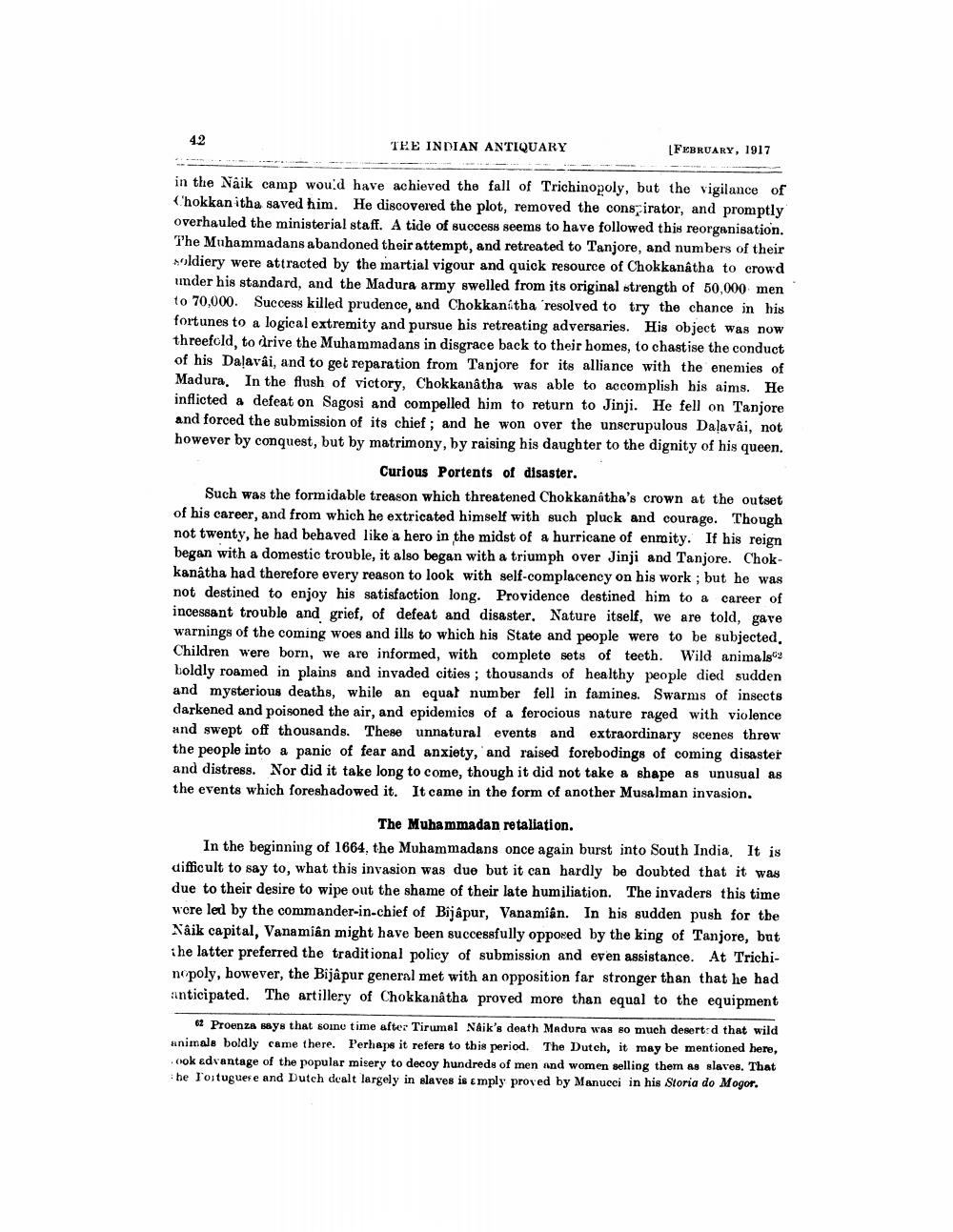________________
42
TPE INDIAN ANTIQUARY
[FEBRUARY, 1917
in the Naik camp would have achieved the fall of Trichinopoly, but the vigilance of Chokkan itha saved him. He discovered the plot, removed the conspirator, and promptly overhauled the ministerial staff. A tide of success seems to have followed this reorganisation. The Muhammadans abandoned their attempt, and retreated to Tanjore, and numbers of their soldiery were attracted by the martial vigour and quick resource of Chokkanatha to crowd umder his standard, and the Madura army swelled from its original strength of 50,000 men to 70,000. Success killed prudence, and Chokkanítha 'resolved to try the chance in his fortunes to a logical extremity and pursue his retreating adversaries. His object was now threefold, to drive the Muhammadans in disgrace back to their homes, to chastise the conduct of his Daļavai, and to get reparation from Tanjore for its alliance with the enemies of Madura. In the flush of victory, Chokkanatha was able to accomplish his aims. He inflicted a defeat on Sagosi and compelled him to return to Jinji. He fell on Tanjore and forced the submission of its chief; and he won over the unscrupulous Dalavai, not however by conquest, but by matrimony, by raising his daughter to the dignity of his queen.
Curious Portents of disaster. Such was the formidable treason which threatened Chokkanatha's crown at the outset of his career, and from which he extricated himself with such pluck and courage. Though not twenty, he had behaved like a hero in the midst of a hurricane of enmity. If his reign began with a domestic trouble, it also began with a triumph over Jinji and Tanjore. Chokkanátha had therefore every reason to look with self-complacency on his work ; but he was not destined to enjoy his satisfaction long. Providence destined him to a career of incessant trouble and grief, of defeat and disaster. Nature itself, we are told, gave warnings of the coming woes and ills to which his State and people were to be subjected. Children were born, we are informed, with complete sets of teeth. Wild animals boldly roamed in plains and invaded cities; thousands of healthy people died sudden and mysterious deaths, while an equal number fell in famines. Swarms of insects darkened and poisoned the air, and epidemics of a ferocious nature raged with violence and swept off thousands. These unnatural events and extraordinary scenes threw the people into a panic of fear and anxiety, and raised forebodings of coming disaster and distress. Nor did it take long to come, though it did not take a shape as unusual as the events which foreshadowed it. It came in the form of another Musalman invasion.
The Muhammadan retaliation. In the beginning of 1664, the Muhammadans once again burst into South India. It is difficult to say to, what this invasion was due but it can hardly be doubted that it was due to their desire to wipe out the shame of their late humiliation. The invaders this time were led by the commander-in-chief of Bijapur, Vanamián. In his sudden push for the Naik capital, Vanamiên might have been successfully opposed by the king of Tanjore, but i he latter preferred the traditional policy of submission and even assistance. At Trichinopoly, however, the Bijapur general met with an opposition far stronger than that he had anticipated. The artillery of Chokkanatha proved more than equal to the equipment
62 Proenza says that soino time after Tirumal Naik's death Madura was so much desert:d that wild animale boldly came there. Perhaps it refers to this period. The Dutch, it may be mentioned here, ook advantage of the popular misery to decoy hundreds of men and women selling them as slaves. That he l'ortuguese and Dutch dealt largely in slaves is emply proved by Manucci in his Storia do Mogor.




